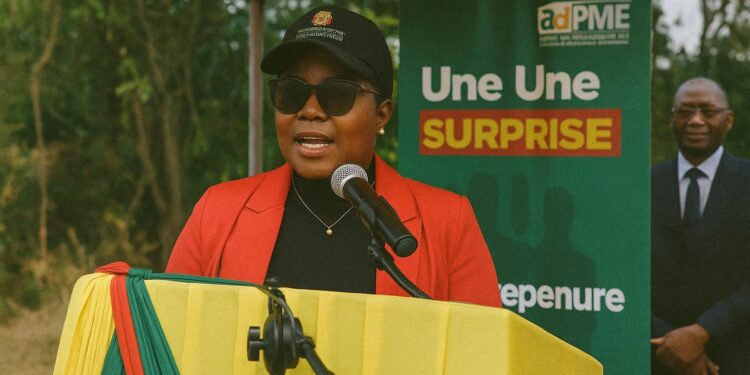A Symbolic Arrival in Kibangou
Under a bright dry-season sky, the convoy of white minibuses bearing the insignia of the Ministry of Small and Medium-Sized Enterprises and Crafts wound its way into Kibangou on 22 July 2025. For many residents of this quiet Niari district, the spectacle evoked rare optimism: the state itself had come to their doorstep. Minister Jacqueline Lydia Mikolo, flanked by local chiefs and parliamentary deputies, cut the ribbon on what she called “a platform for opportunity rooted in our own soil.” Her choice of Kibangou was deliberate. Although modest in population, the district sits astride fertile valleys and a key axis of Road RN1, making it a natural testing ground for the government’s decentralised growth agenda.
Strategic Alignment with National Development Plans
The Entrepreneurship Caravan is not an isolated publicity exercise. It dovetails with the 2022-2026 National Development Plan, which assigns a central role to SMEs in diversifying an economy still heavily reliant on hydrocarbons (Ministry of Planning 2022). By bringing mobile training, micro-credit information desks and market-linkage mentors to secondary towns, Brazzaville seeks to compress the spatial inequities that historically favoured coastal and riverine hubs. International partners have taken note: the United Nations Development Programme recently lauded Congo’s ‘territorialisation’ of policy as a best practice in preventing rural youth migration (UNDP 2024).
Local Resources Meet Youthful Energy
Kibangou’s comparative advantages are agricultural. Red soil plots produce cassava, groundnut and palm oil, while surrounding forests yield bamboo and rattan coveted by craftsmen. In her address, Minister Mikolo urged trainees to convert these raw assets into branded, value-added goods—“from field to finished product, right here,” she insisted. The ministry’s technical officers then demonstrated solar-powered cassava dryers and lightweight weaving looms, illustrating how appropriate technology can bridge rural-urban markets. Such tangible displays, according to a young attendee named Léon Mavoungou, made entrepreneurship seem less abstract and more achievable.
Early Metrics and Comparative Lessons
If the Caravan’s inaugural stop in Dolisie drew 1 281 registrants, Kibangou’s preliminary tally of 683 may appear modest. Yet officials emphasise that success should be measured in conversion rates rather than raw headcounts. During the Dolisie follow-up survey, 21 percent of participants had either formalised a business or opened a cooperative bank account within six months (AfDB 2025). Replicating—or even surpassing—those numbers in Kibangou would validate the Caravan’s scalability across Congo’s twenty-deux districts. Provincial administrator Marie-Thérèse Mabiala remains confident: “Our young people have seen their neighbours prosper. Demonstration breeds imitation.”
Regional Implications for Stability and Diplomacy
Beyond domestic economics, the initiative carries geopolitical resonance. Niari borders Gabon and the enclave of Cabinda, making it a corridor for legal trade and, at times, illicit flows. By formalising micro-enterprises and enhancing livelihoods, Brazzaville hopes to undercut the socioeconomic drivers of cross-border smuggling, thereby reinforcing regional stability (ECCAS 2024). Diplomats posted to the capital underscore that President Denis Sassou Nguesso’s emphasis on ‘economies of peace’ aligns neatly with the African Union’s Agenda 2063. In conversations with foreign envoys, Minister Mikolo stresses that an empowered rural youth cohort represents not only a market but also a constituency for stability.
Balancing Enthusiasm with Pragmatic Caution
Challenges remain. Access to reliable electricity in Kibangou averages six hours per day, and the micro-finance sector still prices loans at double-digit interest. Civil-society observers therefore caution against over-promising quick returns. Even so, the Caravan’s pedagogy, anchored in local languages and concrete demonstrations, marks a qualitative departure from earlier top-down campaigns. As Fabrice Elenga, an economist at the University of Marien Ngouabi, notes, “The policy architecture is credible; execution will determine its legacy.” His assessment echoes a consensus among development practitioners that success will hinge on sustained mentoring after the media glare fades.
Toward a Measured Yet Hopeful Outlook
As dusk settled over Kibangou’s central square, musicians from a youth cooperative—formed, fittingly, during last year’s pilot Caravan—struck up a rumba that blended tradition with contemporary flair. The symbolism was hard to miss: a fusion of heritage and ambition, choreographed by a state that increasingly speaks the language of enterprise. Whether the current zeal matures into durable firms will be scrutinised by economists, diplomats and, most crucially, the young Congolese whose future earnings stand in the balance. For now, the caravan’s engines remain revved, its next stops already pencilled on the ministerial map—a rolling testament to Congo-Brazzaville’s determination to plant seeds of shared prosperity one district at a time.











































